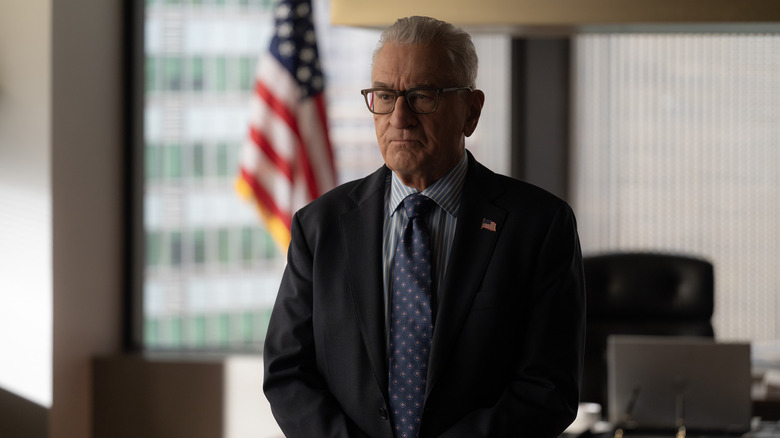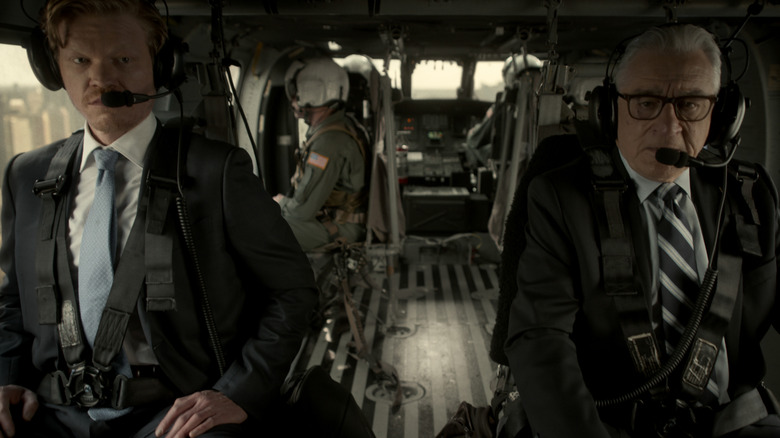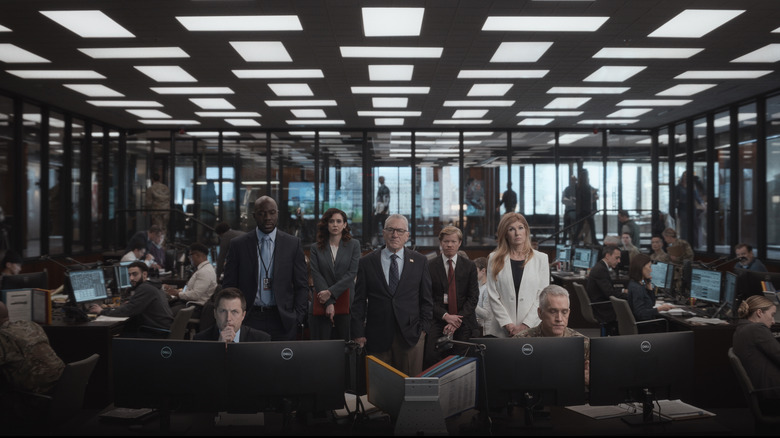Zero Day Review: Robert De Niro's Paranoid Political Netflix Series Arrives At A Weird Time
"Zero Day" arrives at either the best possible time or the worst. It is a paranoid political thriller for our paranoid political times; a series that bundles up hot-button issues plaguing modern American politics today and presents them in a slick, engrossing package. I suppose you could call it "timely," but the problem is that right now, as I write this review, things seem so fraught and perilous in the country that I'm not sure anyone is going to be in the mood to watch this new Netflix limited series, created by Eric Newman, Noah Oppenheim, and Michael Schmidt, and featuring a cast of heavy-hitters led by Robert De Niro (in his first TV series). If you're looking for braindead escapism to take your mind off of how terrible everything is right now, "Zero Day" may not be what you're looking for. And yet, the show isn't nearly as deep and insightful as it thinks it is.
"Zero Day" goes to some silly, over-the-top places and takes a lot of shortcuts, but it's also "real" enough to make you feel kind of horrible. Perhaps that's the point. And perhaps the show deserves credit for not shying away from how bleak things are at this particular moment. To be fair, "Zero Day" isn't trying to offer some sort solution to our problems, nor should it be burdened with such an impossible task. In the end, this is pop entertainment. But it's pop entertainment about how quickly Americans will turn on each other when the chips are down, and it's also about how easily self-righteous politicians can (and will) embrace full-blown fascism to get what they want.
In short, "Zero Day" is not a fun watch, and I'm genuinely curious to see how a wider audience reacts to it (assuming they react to it at all and it doesn't get lost in the dreaded wastelands of the Netflix algorithm). Yet, the show feels like it's only scratching the surface — it's good at pointing things out without exploring them on any deeper level. This creates a sort of lopsided effect, where "Zero Day" seems like it wants to make a grand statement without exerting too much effort. There's something cynical about all of this, but perhaps that's apt: these are cynical times.
Robert De Niro leads a big cast in Zero Day
After an in medias res moment that is later revealed to be a very cheap fake-out (seriously, folks, it's okay to not start your big streaming series with an in medias res scene), "Zero Day" cuts to the chase by unleashing a devastating cyberattack in its first few minutes. The attack only lasts a minute, and yet, that's enough time to sew total chaos and result in thousands of deaths due to the complete failure of technology. The attack also comes with an ominous message sent to seemingly every phone in America: "THIS WILL HAPPEN AGAIN." Desperate for answers, U.S. President Evelyn Mitchell (Angela Bassett, making the most of an underwritten part) decides to assemble a commission to investigate the attack. Picked to lead this commission is former President George Mullen (De Niro), who we're told is one of the last American presidents to enjoy bipartisan support from the American public. Mullen only served one term, deciding to not run for re-election in the wake of a family tragedy. But while his time in office was short, he remains popular, and is seen as the perfect choice to get to investigate the attack.
Mullen is apprehensive: with help from Congress, the commission has been granted the power to do almost anything, essentially shredding the Constitution in the name of getting to the truth. Mullen's wife, former First Lady Sheila Mullen (Joan Allen), tells him that he could be walking into a political trap by agreeing to lead the commission, while Mullen's daughter, Congresswoman Alexandra Mullen (Lizzy Caplan) flat-out tells him not to take the job. Mullen, however, decides that he's the best man for the gig because he's a man of integrity and can steer things in the right direction ... or so he thinks. Of course, almost immediately, the former President begins embracing dictator-like tendencies. Before the series has ended, Mullen will instruct those working under him to round-up seemingly innocent citizens and in one instance, engage in full-blown torture. Time and time again, Mullen tries to justify his actions in the name of doing what's right for the country, but the show makes it blatantly clear that this is a man giving in to amoral darkness. At the same time, "Zero Day" also seems to want to let Mullen off the hook by suggesting he's not in his right mind, either due to illness or some other nefarious explanation. In the midst of all this, the aftermath of the first attack and the looming threat of more attacks to come effectively tears the country apart, with the real chance of societal collapse looming.
De Niro is mostly reserved in the part of Mullen, although he seems to really thrive in the moments where the ex-POTUS becomes thuggish and violent. To make the character more interesting, there's a running bit that has Mullen seemingly tormented by both a tragedy in his past and also the very real threat that he might be suffering from some kind of neurological impairment. This is highlighted by having Mullen constantly hear the Sex Pistols song "Who Killed Bambi?" in his head, and if I'm being brutally honest, I must admit that I wish the showrunners had picked a less annoying tune to play over and over and over again. By the 150th time the absolutely awful song played over the soundtrack, I was ready to turn the show off or at least hit the mute button.
De Niro is backed up by a big, familiar cast — in addition to Bassett, Allen, and Caplan, the series also features Jesse Plemons as Roger, Mullen's right-hand man who is up to some shady stuff, Dan Stevens as Evan Green, a loudmouth pundit who seems to be an amalgamation of Alex Jones and countless other divisive, slimeball media personalities who realized they could make a fortune spouting conspiracy theories and unfiltered hatred, Matthew Modine as the sinister Speaker of the House, Gaby Hoffmann as an Elon Musk-like tech giant, Connie Britton as Mullen's former Chief of Staff, and the always welcome Bill Camp as the director of the CIA. All of these performers are talented and do fine work here, but Stevens, who specializes in playing freaky little weirdos, makes the biggest impression, probably because his character gets to go so big and over-the-top as he riles up his fanbase.
Zero Day reflects our turbulent political landscape, but...
As "Zero Day" unfolds, the series grows increasingly bleak and troubling — this is one of the most humourless shows in recent memory. As Mullen tumbles further down a rabbit hole of poor decisions, paranoid thoughts, vast conspiracies, and full-blown fascist tendencies, the heaviness of all this material begins to weigh on you, to the point where you might find yourself wanting to take a break from all this hopeless misery rather than binging through to the next episode. And yet ... as unapologetically nasty as "Zero Day" gets, it also works hard to take a maddingly centrist viewpoint, likely intended to make the series as palatable as possible to a wide audience. For example: while you'll likely be able to draw conclusions based on context clues, the political parties of the various characters are never deliberately stated or confirmed, which seems like a cheat. This ultimately makes "Zero Day" feel kind of toothless. It wants to say something about the current American hellscape and how divided we all are, but it also doesn't want to offend anyone. And while I get why the showrunners took this approach, it doesn't make it any less frustrating.
And perhaps "frustrating" is the word that best sums up "Zero Day." This is a competently made series with a great cast and an engrossing storyline that hooks you from the jump. And yet, I'm not entirely sure who the series is for. Is anyone in the mood for more politics right now, let alone fictionalized politics that sort of resemble current events but with a fictionalized twist? I can't help but think the show would be somewhat more enjoyable if it was just a little sillier, and a little less concerned with reminding the viewer that things in the United States are kind of irrevocably screwed. There's a potentially hopeful conclusion to the limited series, but it rings false when held up against both the real world and also everything else that happened in the show itself. "Zero Day" deserves some credit for voicing serious concerns about the world (and country) we've built for ourselves, but in the end, it doesn't have much to say.
/Film Rating: 6 out of 10
"Zero Day" is now streaming on Netflix.


